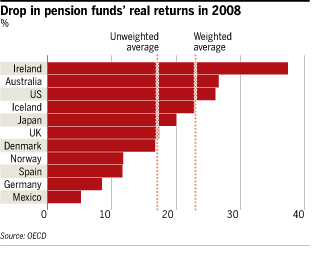|
OECD Warns on Pensions Crisis
By
Chris Giles, Financial Times
June 23, 2009
Strains in pensions systems, in both private and public provision, threaten to turn the financial crisis of the past two years into a social crisis lasting for decades, the Organisation for Economic Co-operation and Development warned on Tuesday.
In its annual analysis of the health of pensions systems globally, the Paris-based organisation found private pension plans lost 23 per cent of their value last year, while higher unemployment “leaves little room for more generous public pensions”.
Angel Gurría, the OECD secretary-general said: “Reforming pension systems now to make them both affordable and strong enough to provide protection against market swings will save governments a lot of financial and political pain in the future”.
Pensioners hit hardest include those heavily dependent on defined contributions, where people save to build up a personal fund, those near retirement and those heavily invested in equities. This applies to many US citizens who have large pension pots, known as 401(k) retirement plans.
For these individuals and for the recently retired who have not bought an annuity, losses will be greatest, the OECD said, exacerbating the sense of a looming pensions crisis worldwide. Those with defined-benefit private pensions are not immune from potential losses, as companies are increasingly restricting the amounts paid.
By contrast, younger workers have time to repair the damage to their pensions. Their losses are also smaller compared with their annual contributions than for those near retirement who have already built up a big pension pot.

Losses in private pension schemes were highest – at over 25 per cent – in countries such as Ireland, Australia and the US, where the greatest proportion was invested in equities. Losses in Germany, Mexico and the Czech Republic, however, were under 10 per cent as private pensions there were heavily invested in bonds. Future incomes from public pensions are not immune from the financial crisis, the OECD warned, because stretched public finances will prevent countries augmenting public provision and might lead to cuts.
Canada, Germany and Sweden, for example, already adjust public pensions in payment according to their schemes’ performance.
The OECD said this form of adjustment “needs a rethink” to prevent cuts in pensions exacerbating the recession. But it does not suggest reversing the proposed cuts, suggesting they are merely postponed until economies recover.
Some countries provide extremely low incomes for poor pensioners with a history of low-income employment.
The OECD singles out Germany, Japan and the US as countries where deficiencies in “old-age safety nets are a concern”.
For private pensions, the recommendation is that governments should ensure most members of defined-contribution pensions gradually reduce the proportion of equities and other risky investments in their portfolios as retirement nears.
Ageing strategy
Planned increases in pensionable age, restricting the generosity of early retirement schemes, less generous public pensions, even cuts in pay for Irish public officials. These are all examples of strategies advanced countries are using to reduce the financial burden of pensions as their population ages.
The financial crisis will focus policymakers’ attention on the short term, warns the Organisation for Economic Co-operation and Development, threatening to postpone long-term strategic planning. Officials in the Paris-based organisation are most concerned about a repetition of the mistakes of the 1980s, encouraging early retirement, which improves unemployment figures today at the cost of fewer workers and a greater pensions burden tomorrow.
The OECD describes these changes over the past five years as “one of evolution rather than revolution in pension systems”.
Over the next 40 years it still expects population ageing, which will create a demographic transformation and increase the burden of pensions on the public purse.
More
Information on World Pension Issues
Copyright © Global Action on Aging
Terms of Use |
Privacy Policy | Contact
Us
|



